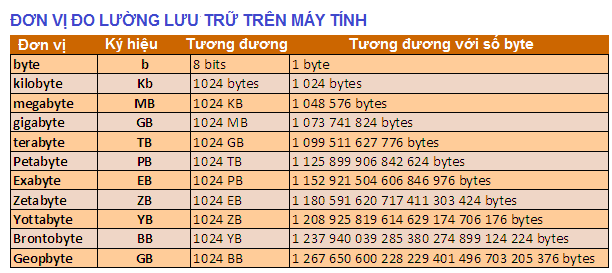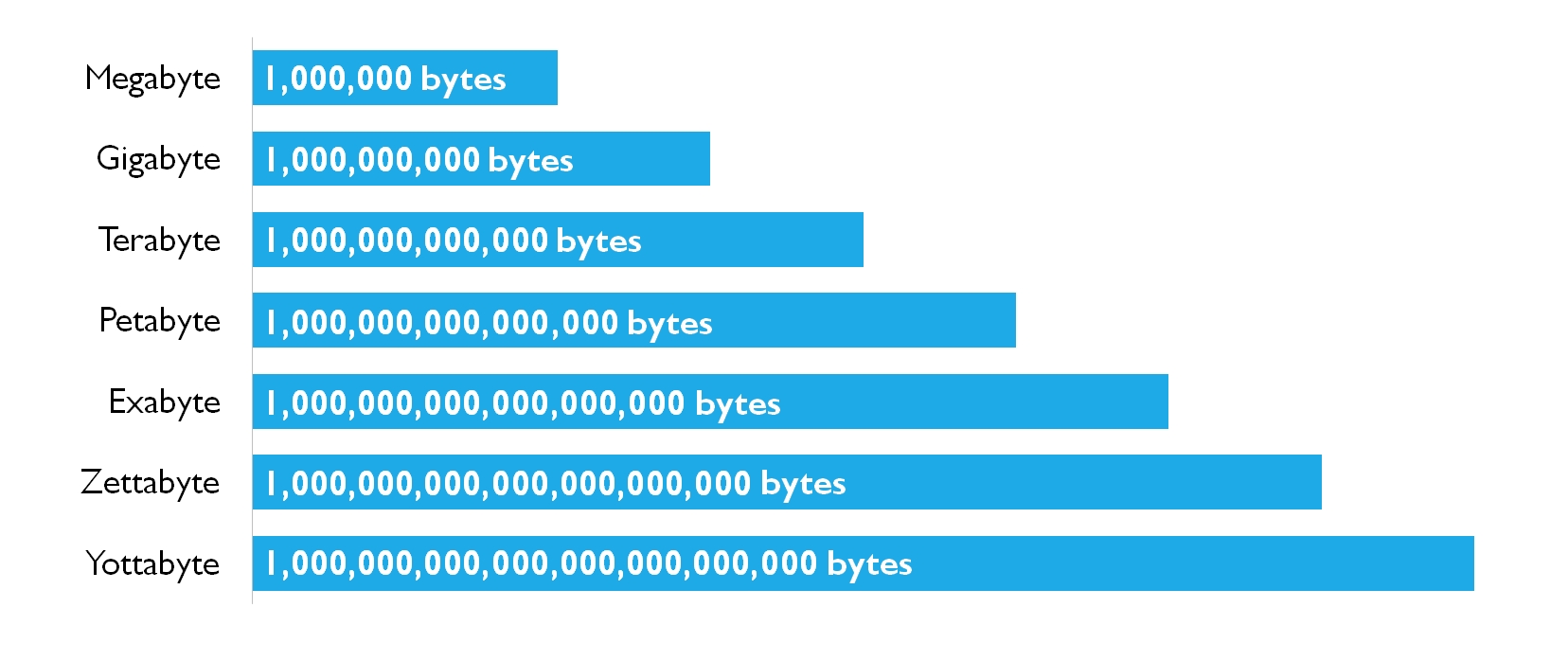Basic measurement units in computers
Bit is an abbreviation for binary digit , is the basic unit used to measure the amount of information in a computer, calculate the capacity of memory such as hard drive, USB, memory card, RAM . Bit is the term for small part Most of computer memory can store either the information state of 0 or 1 (can be understood as the on or off state of transistors in the computer). To better understand the basic units of measurement in computers, please refer to the article below.
Usually on computers using units: Bytes, Kilobytes, Megabytes, Gigabytes, Terabytes . The remaining units are rarely used or even not used because it is too big or too small.

Megabytes (MB), Gigabytes (GB), Terabyte (TB), . are terms used in the computer field to describe disk space, data storage space and system memory. A few years ago we often described hard drive space using the term MB, but currently, new GB and TB are the most used terms when talking about hard drive capacity. So what are they? It's hard to say exactly what "textbooks" these terms are, because there are different definitions in them in the industry.
- According to the IBM computer dictionary, when used to describe disk storage capacity, 1MB is 1,000,000 bytes in decimal notation. But when using MB for real storage, virtual storage and channel capacity, 2 ^ 20 or 1,048,576 bytes are correct.
- According to Microsoft computer dictionary, 1 MB is equivalent to 1,000,000 bytes or 1,048,576 bytes.
- According to The New Hacker dictionary, 1 MB is always 1,048,576 bytes, based on the argument that the bytes should be counted with the exponent of 2.
So what definition do we often use?
When referring to one MB for disk storage, hard drive manufacturers use 1 MB standard = 1,000,000 bytes. This means that when you buy a 250 GB hard drive, you will get a total of 250 billion bytes of storage. This number is confusing, because Windows uses standard 1,048,576 bytes, so you'll find that 250 GB of hard drive only offers 232 GB of available storage, a 750 GB drive will have only 698 GB Available and 1 1 TB drive only 931 GB. Do you understand?
Since all three definitions are accepted, in this article TipsMake.com will try to help readers reach out in the simplest direction. 1000 can be replaced by 1024 and still true if using acceptable standards. Both of these standards are accurate, depending on the type of storage you are referring to.
Virtual capacity, processor (CPU, RAM .):
- 1 Bit = Binary Digit
- 8 Bits = 1 Byte
- 1024B (Bytes) = 1KB (Kilobyte)
- 1024KB (Kilobytes) = 1MB (Megabytes)
- 1024MB (Megabytes) = 1GB (Gigabyte)
- 1024GB (Gigabytes) = 1TB (Terabyte)
- 1024TB (Terabytes) = 1PB (Petabyte)
- 1024PB (Petabytes) = 1EB (Exabyte)
- 1024EB (Exabytes) = 1ZB (Zettabyte)
- 1024ZB (Zettabytes) = 1YB (Yottabyte)
- 1024YB (Yottabytes) = 1BB (Brontobyte)
- 1024BB (Brontobytes) = 1GeB (Geopbyte)

Disk space (Disk Storage):
- 1 Bit = Binary Digit
- 8 Bits = 1 Byte
- 1000B (Bytes) = 1KB (Kilobyte)
- 1000KB (Kilobytes) = 1MB (Megabytes)
- 1000MB (Megabytes) = 1GB (Gigabyte)
- 1000GB (Gigabytes) = 1TB (Terabyte)
- 1000TB (Terabytes) = 1PB (Petabyte)
- 1000PB (Petabytes) = 1EB (Exabyte)
- 1000EB (Exabytes) = 1ZB (Zettabyte)
- 1000ZB (Zettabytes) = 1YB (Yottabyte)
- 1000YB (Yottabytes) = 1BB (Brontobyte)
- 1000BB (Brontobytes) = 1GeB (Geopbyte)

Below is a detailed definition of basic units of measurement in computers:
1. Bit
Bit is the smallest unit of computer memory that can store either the status of Yes or No.
2. Byte
1 Byte is equivalent to 8 Bit. 1 Byte can represent 256 states of information, such as numbers or numbers associated with text. 1 Byte can only represent one character. 10 Bytes can be equivalent to one word. 100 Bytes can be equivalent to a medium-length sentence.
3. Kilobyte
1 Kilobyte is approximately 1,000 Bytes , but 1 Kilobyte definition is equivalent to 1024 Bytes . 1 Kilobyte is equivalent to a short paragraph, 100 Kilobytes is equivalent to 1 page A4.
4. Megabyte: 1 Megabyte is approximately 1,000 Kilobytes . When a new computer was born, 1 Megabyte was considered a huge amount of data. It is normal for a computer to have a 500 Gigabyte hard drive, which is normal for a Megabyte .
A previous 3-1 / 2 inch floppy disk could store 1.44 Megabytes or the equivalent of a small book. 100 Megabytes can store some Encyclopedias books. 1 CD-ROM drive with a capacity of 600 Megabytes.
5. Gigabyte
1 Gigabyte is approximately 1,000 Megabytes .1 Gigabyte is a fairly common term used today when referring to disk space or storage drive. One Gigabyte is a large amount of data that is nearly twice the amount of data that a CD-ROM can store. But only about 1,000 times the capacity of a 3-1 / 2 inch floppy disk. 1 Gigabyte can store the amount of books about 10 meters long when loaded on the shelf. 100 Gigabytes can store the number of books in a library layer.
6. Terabyte
1 Terabyte is approximately one trillion (million) bytes or 1,000 Gigabytes . This unit is so large that this is not a universal term yet. 1 Terabyte can store about 3.6 million photos of 300 Kilobyte size or about 300 hours of good quality video. 1 Terabyte can store 1,000 copies of the Britannica Encyclopedia. 10 Terabytes can store a library. That is a large amount of data.
7. Petabyte
1 Petabyte is approximately 1,000 Terabytes or one million Gigabytes . It is difficult for you to imagine the amount of data that a Petabyte can store. 1 Petabyte can store about 20 million 4-door filing cabinets filled with text. It can store 500 billion pages of standard size printed text. With this amount of data will need about 500 million floppy disks to store.
8. Exabyte
1 Exabyte is approximately 1000 Petabytes . In other words, 1 Petabyte is approximately 10 caps 18 bytes or 1 billion Gigabytes . It is very difficult to compare with an Extabyte . One compares 5 Extabytes that contain an equal amount of all the words of all humanity.
9. Zettabyte
1 Zettabyte is approximately 1,000 Extabytes . Nothing compares to a Zettabyte but to represent it, it will need to use a lot of 1s and 0s.
10. Yottabyte
A Zottabyte is approximately 1,000 Zettabytes . Nothing is comparable to a Yottabyte.
11. Brontobyte
1 Brontobyte is approximately 1,000 Zottabytes . The only thing that can be said about the size of a Brontobyte is that there are 27 0 digits behind the 1 digit!
12. Geopbyte
1 Geopbyte is approximately 1,000 Brontobyte. I don't know if in my life we can see 1 Geopbyte hard drive, 1 Geopbyte is equivalent to 152,676,504,600,228,322,940,124,967,031,205,376 bytes! (size: 152 million 676 thousand 504 billion billion billion bytes (can not read correctly yet @@)).
Now you have a good understanding of the measurement units in computers, right?
Explore more:
- 5 ways to overcome the situation of slow computer
- 4 Ways to Reset Windows to its original state
- How to fix a computer or hang
Having fun!